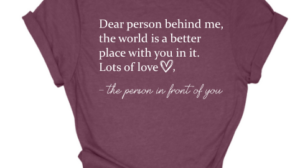Justin Bieber is singing it on the radio a gazillion times a day, and his fans (and even surprised non-fans who admit his album “is actually pretty good”) admire him for it. After a tumultuous few years, he’s made an incredible come back and this week his manager Scooter Braun made news when he admitted in an interview that there was a period when he really thought Bieber could die if he didn’t change his life.

A huge hit, a big media story, and Justin Bieber is celebrated for “Sorry”. Speaker, mentor and author Betty-Ann Heggie says this isn’t at all surprising. In her recent blog post Closing the Gender Apology Gap, Heggie explains how there’s a gender apology gap that exists, whether we’re aware of it or not.
Men don’t apologize routinely, admit to a basic error or fault, and we don’t expect it from them. If they offer a heartfelt apology, we are grateful, heap them with praise and put them on a pedestal. We credit them with being strong and confident. Our admiration grows, as does our perception of their leadership capabilities.
Women, on the other hand, have a habit of apologizing regardless of the situation. We over-apologize, and society expects it from us. Constantly saying “sorry” lowers our status, reduces our credibility and makes us seem like doormats. The problem is that women have a lower margin of error when it comes to offensive behaviour. We say “sorry” as a way to cement goodwill, and it becomes a bad habit.
– Betty Ann Heggie
It makes sense, doesn’t it? Seen in a business sense, it’s clear how the impulse to apologize will make a person seem less valuable in the long run, yet a male leader who apologizes is looked at entirely differently. Think about it in your household – who apologizes more? Or, alternatively, how does the environment or mood in the household change when it’s the husband who apologizes with a heartfelt “I’m sorry.”
An apology reorganizes the power hierarchy and makes us indebted to another person (for at least a little while). Men who are used to having power over others find this unsettling; it rattles their sense of security.
– Betty Ann Heggie
It’s not to say that being apologetic and asking forgiveness is a bad thing – it’s quite the opposite and it’s a good thing to admit when we’re wrong and say sorry. But it changes things, don’t you think? When my husband apologizes, the disagreement or hurt feelings are gone, though I admit I do feel a sense of triumph because he apologized.
Later in her post Betty Ann gives examples women have shared when they apologized unnecessarily, and I found myself nodding along with the examples. Do you apologize before asking a waitress for extra cutlery? Or if your meal is wrong? Why do we apologize for these things, when it’s not necessary?
When women apologize unnecessarily, we put ourselves in a ‘power under’ position and lose any chance at the equal status that comes with partnership. Furthermore, it erodes our abilities to make important declarative statements that would establish us as leaders.
– Betty Ann Heggie
While apologizing to a server before pointing out your steak is under-cooked isn’t a big deal, it’s part of a bigger issue that can sink you in the workplace or in relationships.
How do we close the apology gap? Betty Ann suggests that women need to keep their apologies in check, and men need to increase their responsibility and offer up apologies more frequently. Once we start to close that gap, we can be on more equal footing (yes, there are other gaps between the genders we need to address, but that’s what Betty Ann Heggie’s website and mentorship are for too!)

We’d love to hear your thoughts on the gender apology gap. Have you seen an example where a male apologized and it was a big deal, or do you notice yourself saying sorry more often than you’d like? Share your comment below and you’ll be entered to win a $100 PayPal (I’m sorry, but I’m insisting you spend it on yourself. Again, sorry, you’re just going to have to. Sorry.)







I feel I say sorry to many times especially at work. I work in a small space with several others whom I either bump into or they bump into me. Hate it. Should just say sorry at the beginning of the shift. lol/
I do say sorry a bit too often for things i probably shouldn’t. I need to learn to say sorry less, there is a thing as too much
Yes I apologize far too much even for things I could not control. It is a bad habit that I need to stop.
I do apologize if I think I’m in the wrong, I will not go out of my way to apologize nor will I apologize if I don’t think I’ve done anything wrong
I say sorry all the time. There’s not enough hours in the day to do everything that needs to be done. I always feel like I’m apologizing to someone for not being able to do something or not getting something done on time. ;S
I think it’s very true that men are more highly praised for apologizing because it is less expected of them.
I feel that this post is probably right in that women tend to apologize much more than men. Do I apologize more than my husband? Yes. Does he fix things around the house more than me? Yes. Are either of these things a problem? No. I think they’re a positive more than a negative. I don’t want to fix things around the house. He feels genuine relief when I am the first to apologize and end a fight. Men and women are not the same – there are brain differences, hormonal differences, etc. I do not feel that me trying to act more like a man will increase equality between the sexes.
Not sure why we make a big deal out of celebrity’s apologies they are only apologizing because they got caught and it could hurt their earning potential, such phoniness. If they have done something that really offends me I stop buying, listening to or watching anything they do or are associated with.
I 100% apologize too much; even if I am not ‘guilty’ or needing to apologize.. it’s always heartfelt as well! I honestly dont think there is anything wrong with that as well
Yes, I can definitely identify with the examples. I find I apologize to be polite and not necessarily when warranted.
I’ve been told that I say sorry too often. I can’t help it though if I truly am sorry then I say it. I think women say it more often than men and men don’t say it enough.
Yes, sometimes I can apologize too much.
I probably could apologize more. I also find that I apologize out of politeness not necessarily when it’s warranted.
I went to a workshop way back during in high school and they talked a bit about the our tendency to always apologize, and for awhile, I stopped doing so but old habits die hard! This post is a great reminder.
I say sorry all the time, must be a Canandian thing. It’s about as frequent as I say hello.
I tend to apologize too much. It’s instinctive. Sometimes I know it’s not anything to do with me, but I apologize anyway.
I’ve started to say No more without adding the Sorry but still probably over apologize more then I should. My husband even called me on it a couple weeks ago.
I say sorry a lot…..even for things out of my control. I hate to inconvenience others and do when I feel like I am a pain or not doing my share or mess up, I say sorry.
I find that I do apologize too much. I was told I’m too Canadian. For me, I feel like it’s just a natural reaction, even if I am not at fault.
I do find that I say sorry a lot, I figure it is better to say sorry than to not. But I do agree that woman tend to say it more than men do. I am not in the work force so don’t have an example from there.
I think i don’t do it enough… Or feel my apology enough… You know when you do it cause it’s what to do but never ask yourself, do i really mean it ….
I don’t think I do it too much, I am one I don’t say sorry unless I mean it, some do make a habit of it and I tell them no need to be sorry all the time
My husband is ALWAYS telling me I apologize too much. I even say sorry for saying sorry to much. It’s just so much in my system that I don’t know how to stop it. On the other hand my hubby says sorry very little. Only if he’s done something really wrong does he offer an apology. Sometimes I feel he should apologize more and me less.
I say sorry a lot, for things i shouldn’t , for things i should..whenever. I do remember a long time ago when i was working and accused of something i didn’t do, I didn’t apologize for it and stuck to my guns. It went on for weeks that I was the guilty one and could have lost my job from it…my manager who was a man did apologize to me when it all came out that I was the honest one. His Manager a woman, did not apologize to me and made me feel like it was still my fault. I don’t always think it’s a gender thing.
I do say I’m sorry a lot. Sometimes when I call someone and say I am sorry I never called sooner, or if I am late going to visit someone. I have things in my life that hold me back so I shouldn’t have to say sorry all the time.
I do catch myself apologizing way too much, for things that I can’t control, things that are not my fault. I of course apologize when I am wrong or make a mistake, but I probably say sorry way more than I need to.
I apologize too much as a customer. We should be able to politely ask for what we want or expect when it is reasonable without apologizing first.
This describes me to a t. I am a peacemaker and I apologize too much. I can totally relate.
I definitely fall in the camp of people who apologize too much.
I feel that I apologize when needed. I am not a person who over do it.
I do try to only apologize if I do in fact do something to warrant it, but I have found myself over apologizing at times
I am continually saying i’m sorry for things i have not done or have control over.
My husband has apologized a few times and I have likewise. We’re still together 😉
I am constantly apologizing . Trying to work on it as I apologize for others aswell
Yes, I find ‘sorry’ is a word I say a lot, both at home and at work. This article is a good reminder about the impact that word can have, and that I should try to use it more selectively.
Men can be very stubborn and have a hard time accepting that try are wrong, women have an easier time apologizing but not necessary meaning it. I think men are more likely to mean a “I’m sorry” by expressing in action like doing something nice, unlike a women who will probably just say the words.
I dont think so but others say i apologize too much
I only apologize if i am in the wrong
I find I apologize too much, some times for ridiculous reasons.
I do apologize too much, but I’m working on it!
I do apologize way to much but there are a few people in my life that need to apologize to me but that hasn’t happened and it bothers me!
I only say sorry when I truly am in the wrong.. people that say sorry too much kind of takes away from when they are REALLY sorry.
I probably don’t say it enough – thanks for teh reminder 🙂
I think when I was younger I probably apologized too much and not for the right reasons.
It is easy for me to apologize when I know that I have done something wrong and sometimes I can see that not saying anything is the right thing to do.
Often times I feel like I do not apologize enough.
I do feel that women do a lot of over-apologizing. I know for my own part, I am working on defining my own (realistic) expectations of what I can do and what is expected of me. A great thing that comes with age is that you stop feeling responsible for apologizing for the things you are not. I’ve become a lot more accepting of who I am, and what I can contribute.
I do apologize quite frequently & am working on it. But there are worse habits a person can have than saying “I’m sorry.”
I think it’s known that Canadians as a whole say sorry way too much. But it’s done with kindness so really I don’t see that it’s really a bad thing. I do apologize for things even when they’re clearly not my fault or even sometimes when it doesn’t apply. I guess that’s just the Canadian part of me & I accept it!
I would say about 5 or so years ago I used to sorry all the time. Now…. nope 🙂
I really apologize way too much , I don’t really get why.
I’ve learned to stop apologizing so much. Because, sometimes, I would find myself apologizing just for being who I am. I’m learning to accept myself as I am and not how society expects me to be.
I apologize when I’m wrong and had a hard time doing this with kids . It felt like I’m an adult so I should be right all the time. I’m a lot better at it now and don’t think twice about apologizing when I’m wrong.
I find I apologize too often
I do apologize more than I should. Often I find myself apologizing for things that happen which are beyond my control so that makes it worse. I am going to have to work on improving.
I apologize for things more often than I should.
I do apologize if I am wrong or doing something wrong. But I never get into arguments with anyone.
I don’t think I apologize too much.
I would say that with small things I wayyyy over apologize. Flipping the channel to something I wanted to watch and making hubby miss a moment in a sports game (not a real example of something ive done but this type of thing is my flaw). However, with legitimate errors where I should apologize I dont think I do enough. I would say my husband does the opposite in both scenarios. Is confident and quiet at the small things he does and apologizes to me when it is big and counts. So I definetly agree with the article that women tend to lower their own status by overthinking and apologizing for stuff that just doesn’t matter.
Yes i definately apologize too often. I try to please everyone but it doesnt always happen.
I do apologize way more than I should but I don’t think it has to do with gender. I think it has more to do with how I was raised and made to feel ashamed or like a burden if I were to ask for something. I have a really hard time asking for help from someone whose job it is to help,or when something happens that is clearly not my fault. I often apologize for assistance, unnecessarily.
I do say sorry a lot. Even if it wasnt my fault, i dont like confrontation & would rather just appologize. Probably not the best but Im working on it.
Sometimes I will say I am sorry just to make people shut up and end arguements. I hate dealing with things that mean ntohing anymore.
I apologize way too much for things that I may have done wrong. I am a peacemaker and I don’t want things to drag out too long.
I apologize all the time, even if someone else gets in the way.
I apologize for things way more often than I should.I even apologize for things I have no control over
As a Canadian I feel that I apologize quite often..not a bad thing just the way I am
I find I do apologize alot even if I don’t really feel I need to, sometimes I do it just to calm a situation.
I say sorry way too often even when I am not in the wrong.
I apologize too much for things that is not even my fault. Sorry is used much more than I drink water
I apologize for everything I do! I’m wondering if it is a Canadian thing lol sorry
It’s funny because I say sorry too much for things I’m not really sorry for (and shouldn’t be) but I find it hard to say sorry when I really do feel that way.
I think I apologize way too much.
I realize I do apologize too much and need to be more aware of it.
I can see how over apologizing when it becomes habitual and meaning less lessens our credibility. But also can not agree with her statement – we put ourselves in a ‘power under’ position and lose any chance at the equal status that comes with partnership, when making a sincere apology for a wrong.
I don’t apologise unnecessarily but my husband does!
I always apologize if I think I’m in the wrong
I do tend to apologize way to much! I Am always saying Sorry!
I only apologize when I have to. I try and make sure I don’t give myself a reason to do so.
I think I apologize just to keep a little peace and resolve tense situations, it is more like the end of the fight than an apology or as I say temp apology.
I feel like I may apologize a bit too much at times but I would rather apologize too much than not enough (or at all)
I definitely apologize too much, mostly with my husband. I find myself for saying sorry for everything, like it’s my fault. It’s really a hard habit to break. The sad thing is when you apologize so much, you start to think that anything that goes even a little wrong is your fault.
I apologize WAY too much! It seems to run in the family- my mother, my sisters and I, and now my daughters! I say it so much, I don’t even realize I’m saying it anymore.
I don’t like to get into situations where I need to apologize. I like to compromise.
My husband is better at apologizing than I am in our relationship. I tend to feel weak when I have to do it. I seem to have no problem saying sorry to others tho. it seems our history has more to do with it than I ever thought.
I absolutely apologize too much. Sometimes without thinking before I do.
I feel like I often apologize right away and then I take time to think about it and realize…. it wasn’t just me in the wrong… and then sometimes I wish I’d handled it differently!
I do say I am sorry a lot, but it seems to be just a politeness thing. I apologize less often and often for others in the family. I’ll have to rethink it.
Oh I apologize way to much too without even thinking about it. Thinking about it, I do it alot while out shopping if I need something or would like them to check if something is in stock. I always apologize for bothering them, when it is their job. I do tend to apologize alot at home…when its not needed. I am going to think about it more when I do…and try to apologize less when its not needed. I LOVE when men apologize when they are wrong. It makes me appreciate them so much more!
Yes I think I say sorry too much sometimes. A lot of the time it is in public
I definitely say sorry a lot especially in public situations. It is almost natural and makes me feel more courteous.
I do apologize unnecessarily sometimes.
I often apologize and sometimes I apologize for things I didn’t do wrong.
i say excuse me more than sorry now that i am older. and i realize there are times when you should say it in order to avoid confrontation.
I wonder what he’s saying sorry *for*.
I use “I’m sorry” and “I apologize” differently. “I’m sorry” expresses sympathy or sometimes empathy, “I apologize” means I recognize my responsibility and am going to try to do better in the future. Sometimes they overlap.
Yep, I say, “sorry” way too much. For little things that I’m not sorry or even responsible for. Just being polite, but I think it comes across as lacking in confidence when done so frequently and unnecessarily.
I feel I apologize too much some times!
Being polite and apologizing should not be seen as a weakness unless you are looking for ways to create the gender gap.
Do we praise children when they do something appropriate? Why not do the same for any other human regardless of gender. If a guy apologizes when he usually doesn’t, that’s a good thing and women apologizing less does not make sense. This current phase of finding offense in everything is incredibly tiring.
Sometimes I apologize too much when someone asks me to do a favor for them, but I just really couldn’t because of other commitments.
A sorry does not mean anything unless action follows. I can accept an apology, but I need to wait and see if you really mean it.
I say sorry a lot. Sometimes, I say sorry for saying sorry. Lol
I do apologize too much. Even when it is not my fault I try to apologize to diffuse the situation.
This was quite an interesting read. I’ve never thought about whether or not I apologize too much but I do have a friend who says sorry about every little thing she does (I think it’s a bad habit!) and it’s super annoying! Now that I am more aware of this, I will be more mindful of whether or not I apologize too much!
I do apologize too much, I’ve been told that a lot.
I don’t apologize unless I need to. And when I do, I mean it. My wife, however, apologizes all the time over nothing – so does my kid. Apologies are like tools, use them too much and they break and become useless.
I apologize quite a bit in public, especially if I feel I’m in the way. As for in a restaurant, I definitely apologize and keep friendly. No one wants spit in their food. LOL. I don’t feel my polite apologies are unnecessary though. Politeness is a beautiful trait of most Canadians.
I probably say sorry a little too often. It’s kind of automatic
I feel when when I was younger, I did say sorry all the time. I felt it necessary to show others I was being polite and considerate, however, often times I admit, I really was not sorry. Now, I am older, I only apologize when I am truly sorry and I have learned though the years, there are ways to show others I am polite and considerate.
I probably do apologize too much but I hate to leave anybody mad at me
Sometimes I say sorry when it is not even warranted!
Sometimes I apologize more than I should.
I tend to apologize too much.
I probably apologize more than I should but I don’t feel bad about doing so. I have a friend who says sorry for EVERYTHING!
Sometimes I catch myself saying “Sorry …”, when I could easily have said “Excuse me” instead. I notice it happens while I’m shopping, or wanting to pass someone, yet I’ve sometimes even caught myself saying sorry when someone else bumps into me (and I haven’t even seen who they were or what the situation was before the words were already out of my mouth)! Anyway, usually this is happening with complete strangers that I’ll likely never see again … so I’m ok if I’ve been overly apologetic/ unnecessarily polite / possibly even putting myself temporarily in a “power under” position with those strangers. I can accept that. Some of those same strangers have also replied in kindness with a “no worries, no need to be sorry” statement.
Now, in my ongoing relationships I don’t think my apologies are as instantly frequent where the words could appear to lose their meaning … or I’d hope not anyway. 🙂 I believe being able to sincerely apologize & forgive are 2 great traits for either gender, for all of us to strive for . And, in my opinion anyway, none should be made to feel sorry for saying sorry.
I definitely apologize too much, but I’m okay with that. Sometimes, it because I did something that is deserving of an apology, sometimes it is even a means of respect.
I don’t say sorry to much only when needed
Yes and no
i am glad Beiber seems to be cleaning up his act… it was a bit of a nightmare wasn’t it?
I do apologize gladly when something is my fault, but I usually also have a defense ready lol
Yes, I do apologize too much sometimes.
I find I do apologize too much. I sometimes even accidentally apologize when it’s not even my fault.
I know I’m not alone in this ~ and Justin Bieber aside, women tend to fall prey to this more than men ~ but I guess I tend to act like if one apology is good, two is better ~ and I always apologies profusely even just for an accidental nudge to a stranger in a crowded store!
Worse, friends, colleagues and even people I have a chilly relationship point out the I tend to say I’m sorry when something has nothing to do with me whatsoever and what I really MEAN is that I’m sad to hear that something bad happened to someone (anyone) and then people (especially less less nice people) will say back to me:
“Why are YOU sorry ~ it’s NOT YOUR fault!”
Which I know and is not what I intended or meant. But I’ve leaned that when one is trying to express sympathy /empathy and uses the word “sorry” people will tend to (intentionally?) misunderstand your intent and meaning.
i.e.. When someone passes and your say to survivors “I’m sorry for your loss” ~ it doesn’t mean you BLAME yourself for the death and no one ever misconstrues your meaning in that context. Just saying.
I do have a tendency to say I am sorry too much.
It’s something I’ve been working on.
thank you
I used to overanalyze things and apologize constantly. I realized that I was wasting time hyperfocusing on things no one else even remembered and by apologizing it simply brought it up again! So I try really hard to look at a situation objectively first.